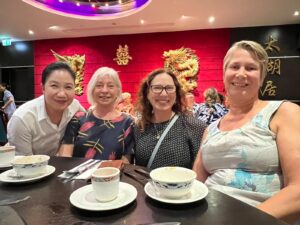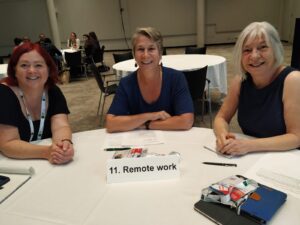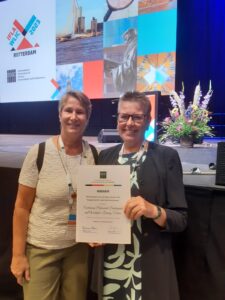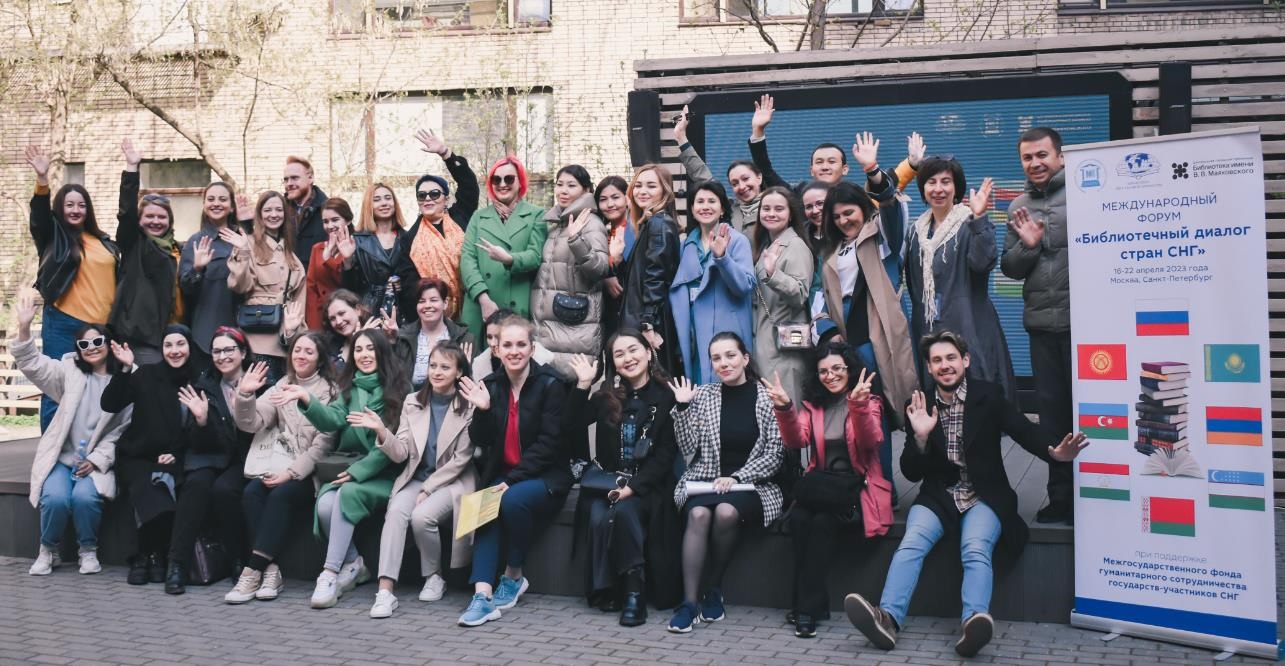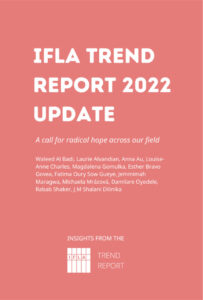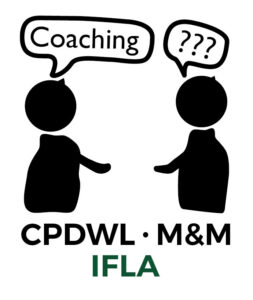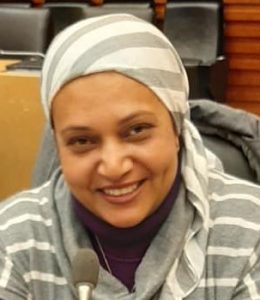Colleagues, we are excited to announce the our newest episode (season 5) of the CPDWL Podcast Project where we feature library and information professionals who support and participate in professional development work.
Our guest host for this episode is Dr. Gill Hallam, CPDWL Standing Committee Member. This episode’s guest is Vicki McDonald, IFLA President-elect 2022–2023.
Special thanks to Leif for coordinating the recording, from Digital Media, State Library of Queensland.
See here for the podcast episode.
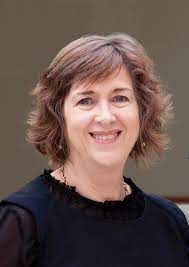
Vicki McDonald is a recognised leader in the library and information sector. Spanning four decades, her career has included leadership roles in public, academic and state libraries.
Her professional interests include a client-centred approach to designing services and spaces, digital inclusion, services to First Nations people, and a commitment to delivering lifelong learning opportunities for the community and profession.
In 2016, her national and international experience led to her appointment as State Librarian and Chief Executive Officer of State Library of Queensland. She understands the need for a strong, relevant and innovative library service and this is reflected in State Library’s achievements under her leadership.
In her current role, Vicki provides strategic leadership for a significant program to transform State Library’s services, collections and spaces through State Library’s Digital Strategy: Digital by Design. State Library is recognised for its services to First Nations communities, and for documenting and making accessible content related to Queensland’s First Nations peoples. To ensure that State Library retains its world-class status, she is championing the development of a strategy to renew spaces within the nationally recognised building.
Her reappointment at State Library of Queensland in 2016 renewed a long association that started in 2001. As an Executive Director at State Library, she was involved in policy, client services and collections before taking on the role of Associate Director Library Services (Client Services and Learning Support) at Queensland University of Technology from 2009 to 2013.
As Executive Director Library and Information Services and Dixson Librarian at the State Library of New South Wales from 2013 to 2016, Vicki was responsible managing the library’s collections valued at AUD$3B and for leading a significant organisational change program.
Vicki is currently serving a two year term (2022-2023) as the Chair of National and State Libraries Australasia (NSLA) – the peak body representing the national, state and territory libraries of Australia.
Throughout her career, Vicki has been very active in professional associations. She has held leadership positions with the Australian Library and Information Association (ALIA) since 2000, and served as its President from 2017 to 2018. Vicki is currently chair of the ALIA International Relations Advisory Committee, which advises the ALIA Board of Directors on the development and delivery of ALIA’s strategic action program for international engagement. She has a strong commitment to professional development and chaired ALIA’s National Biennial Conference and Information Online Conference committees for a number of years. Under her leadership these conferences have been very successful and this has made a vital contribution to the economic sustainability of ALIA.
Vicki is very active in the International Federation of Library Associations and Institutions (IFLA). As the Chair of the Professional Committee (2019–2021) she was an ex-officio member of the IFLA Governing Board and Chair of the Congress Advisory Committee. During 2017-2019, Vicki was elected Chair Division I (Library types) and was a member of the Governing Board. She also deputised for Professional Committee Chair. Vicki has also been a member of IFLA’s Asia Oceania Section Standing Committee and is currently a member of the IFLA Academic and Research Libraries Standing Committee. This strong commitment to IFLA builds on her previous officer roles in Metropolitan Libraries, and on Academic and Research Libraries Standing Committees.
***
Transcript reviewed by Gill Hallam
Gill Hallam 0:01
Hello everyone. This is Gill Hallam and I’m a member of the CPDWL Standing Committee. Welcome to the IFLA CPD WL podcast project. In this program we talk to library and information professionals who support and participate in professional development work.
Today’s guest is Vicki McDonald, incoming President, and welcome to Vicki. Let me just introduce Vicki with a few more details.
Vicki is a recognised leader in the library and information sector. Spanning four decades, her career has included leadership roles in public, academic and state libraries here in Australia. Her professional interests include a client-centred approach to designing services and spaces, digital inclusion services to First Nations people, and a commitment to delivering lifelong learning opportunities for the community and for the profession.
In 2016, her national and international experience led her to her appointment as State Librarian and Chief Executive Officer of the State Library of Queensland. She understands the need for a strong, relevant and innovative library service, and this is reflected in State Library’s achievements under her guidance. In her current role, Vicki provides strategic leadership for a significant program to transform State Library Services, collections and spaces through State Library’s digital strategy, Digital by Design.
State Library is recognised for its services to First Nations communities, and for documenting and making accessible content related to Queensland’s First Nations peoples. To ensure that the State Library retains its world class status, she is championing the development of a strategy to renew spaces within the nationally recognised building.
That’s quite a portfolio of activities to take care of! So let’s look at you personally to start with…
If you had to describe yourself in only one word, what word would it be?
Vicki McDonald 2:13
Well, firstly, Gill, thanks for the opportunity to have a chat today. And, that certainly is an interesting question: one word. If you ask ChatGPT to describe me in one word, it would say ‘inspiring’, but I think perhaps that’s influenced by the fact that State Library’s vision has ‘inspiring’ in it, and my name is often associated with the State Library’s vision. But personally, I would say ‘resilient’.
As a CEO, I’ve had to respond to a lot of unexpected challenges across the last three to five years. Like everyone, we’ve been particularly impacted by COVID, the lockdown pivoting to online delivery, phased reopening of our and our service delivery, but also navigating legislation around vaccination and how it applied to both our clients and our staff. So and, of course, underlying all of that was supporting staff through a fairly significant change in their lives. And just after we came out of COVID, and things were starting to look, you know, like they were going to improve, we were hit by the 2022 floods. And our building, as you know, is on the river, right on the river. And so we were closed for several months, and it took over 12 months to restore access to some of our spaces. So it’s been a pretty challenging time over the last three to five years and I had to call on lots of inner strength, I think in that particular time. So ‘resilient’ is the word that comes to mind for me,
Gill Hallam 3:45
Thank you, Vicki, and I’m sure ChatGPT wouldn’t have come up with quite such a response is that in terms of understanding what goes on behind the scenes, and not on the actual front side, so I thank you.
And so what compelled you to become a librarian? How did you actually get started?
Vicki McDonald 4:09
Well, I think like many colleagues who work in this profession, it was accidental. I grew up in a small regional town called Dalby and many of my friends were leaving school and taking jobs, and I saw an advertisement in the paper at the Dalby Wambo Public Library for a library assistant. And I thought ‘that sounds like a good job’. So I applied and I got it. And then I moved to Brisbane, I did a library technician’s course. And then I did my Bachelor of Arts in librarianship, which at the time was offered externally. So I did that as a corresponding student for six years. So that was a real test of resilience, I think, in a way, certainly set me up and then after I’d finished my BA I then done some further study but certainly have really enjoyed working in this sector. And I think it’s a sector that you get so much out of and it has been very professionally rewarding,
Gill Hallam 5:03
Great… I’m sure many of our people in our audience will understand that sort of pattern of a career development of stepping stones as you go through. But having come from a small regional town like Dalby, what does ‘global librarianship’ mean to you? There’s quite a quantum leap between a small country town, and, you know, the world of libraries.
Vicki McDonald 5:27
There sure is, yes. And I think whenever, you know, think about global librarianship, you know, I reflect on IFLA’s vision and our mission as well. Our vision is to be a strong and united global library field, you know, powering literate informed and participatory societies and, and similarly, we have global mentioned in our mission to inspire, engage, enable, and connect the global library field.
And, to me, global librarianship is all about collaboration. It’s the working together, sharing our expertise, and working together to resolve our common challenges. And over the years, one of the things I’ve come to realise, as I’ve worked in many different organisations, and worked with many other professions, is that this willingness to collaborate and share is somewhat unique to our profession. And I know in working with other professions within my own organisation, they’re often surprised that I can say, oh, I’ll just ring so and so. And I’m sure they’ll share their document with us. And I think that collegiality is somewhat unique. But it’s also a great strength of our profession. And I think I see that at a local level within my own library and the work that I do, but I also see at a global level, that ability to be able to reach out to anyone across the world to get advice and reflect on their experiences and skills and things like that.
Gill Hallam 6:50
Yes, that’s right. And that those people can contribute too, it is that collaborative activity that builds the strength of the profession, I think, as well.
But your next role: you’re coming into the role of IFLA President! And that’s exciting, but I’m sure also challenging. But let’s take a step back. How did you first get involved with IFLA,
Vicki McDonald 7:13
I first became involved when I was invited to go to the MetLib meeting, which was in Singapore in 2004. So Christine Mackenzie, who you would know as a previous IFLA President as well, suggested that I come along to that meeting. And I just found it so exciting and interesting. And for many of the things that we’ve just talked about in relation to global librarianship: having that opportunity to meet with colleagues from the UK, the US and Singapore itself. Singapore was pretty amazing looking at their public libraries. And that really got me hooked. And I went on to go to MetLib meetings every year for many years. But my first World Library & Information Congress was in Quebec, in 2008. And that was a fantastic Congress. And it coincided with the 400th anniversary of Quebec as well. And I remember I took holidays to go. And my partner, I said to my partner, ‘Look, I’ll just go to a few sessions’. But I got there – and I went, you know, from first session to late at night, every day, and it was just, you know, I really got hooked into it as well, and then continued to go to Congress as ever after, and then got involved in committees as well. So, it’s been a really interesting time.
Gill Hallam 8:33
Indeed. Right. So, thinking back, are there any specific memorable moments for you within the IFLA environment? Anything that stands out as being a really memorable experience for you?
Vicki McDonald 8:52
I, you know, certainly I’m sure like you, I’ve had lots of great memories from congresses around the world. But one of the sessions that really stays in my mind is a session that I attended. It was one of the academic and research libraries sessions, it was a Hot Topics session, which they continue to offer each year. And it was at the 2010 Congress in Gothenburg in Sweden, and the theme of that session was ‘radical collaboration’. And there were three speakers on that particular session, Debora Shorley, from London, and who talked about the issues involved in walking away from the big deals; Andrew Inman from the University of New South Wales, who talked about research impact, and I think that is one of the funny things – I often go to a congress across the world to meet Australians and certainly that was what happened. But the third speaker on that session was Jim Neal from Columbia University at the time, and he talked about an initiative which he was leading called ‘Too Cool’, which was an initiative between Columbia and Cornell Universities where they were working to integrate and share and manage their library processes. And that that particular session stayed with me for a long time. And I still reflect on it. And Jim’s presentation really resonated me with me. And the whole idea around radical collaboration and these two big universities working together to share a problem.
But after Jim had presented his session, and I think each speaker only had five to six minutes, he actually moved around the tables and discussed his topic with each of us at our tables. And, you know, the opportunity to talk directly with Jim Neal, who was, you know, heading up Columbia University, I thought, wow, you know, this is what it was about is his opportunity to have these one-on-one discussions with people who have so much experience to share. And over the years, I’ve reached out to Jim, on different topics, and every time he’s responded, and to me, that’s really what IFLA’s about, and the global librarianship is that willingness to collaborate and share, and just sharing your expertise and how you respond to different challenges.
Gill Hallam 11:11
That sounds really positive in terms of the engagement of sort of working in small groups as well as sort of that plenary type of environment.
Vicki McDonald 11:19
And those Hot Topic sessions are fantastic, you know, they still continue to be, I think, highlights of each Congress as well.
Gill Hallam 11:26
OK, put that on the radar for Rotterdam coming up, that will be good! But what makes you most excited about today’s profession?
Vicki McDonald 11:36
Well, I think it’s probably still the same thing as when I started in libraries: it’s that potential to make a difference. Whether it’s a difference to the organisation that you’re working in, so I’ve worked in universities, or even the broader community and being able to contribute to solving challenges that are facing the respective community that you’re working with. And I think, here at the State Library of Queensland, we’re a reference and research library, serving Queenslanders. And I think what excites me the most is the diversity of what I get involved in. And, you know, I do find State Library’s particularly rewarding. At the moment, we’re delivering a family literacy program, working with public libraries across Queensland, which is really focused on ensuring that when children start school, they already have the literacy skills to give them a good start. And of course, that links to the SDGs as well. We’ve also at the moment received funding to work with the Queensland Government, and funded by the Queensland Government, to contribute to their digital economy strategy. But also the languages program, we’re doing some unique work here at State Library in documenting, preserving and making accessible Queensland’s traditional languages. So I think that’s what particularly excites me, and you know, gets me out of bed to come to work every day, is the diversity of what we do. But also knowing that you’re making a difference, and it will have impact to the community.
Gill Hallam 13:04
I think all of those points, just highlight their diversity across the different libraries as well, where the community is at the heart of everything. And therefore every community is unique. And therefore there’s no one size fits all in terms of library services and programs. There’s some common denominators, but then lots and lots of individual applications across the world, which is really important to understand.
Vicki McDonald 13:30
And that’s particularly true in Queensland, you know, because we do a lot of work working with public libraries, and Brisbane has one of the largest public library services in the southern hemisphere. But if I go up to the Torres Strait, I’m, you know, on these different islands, which are just, you know, not that far from Papua New Guinea. That’s the diversity of Queensland: great regional areas, great distances to travel, but diversity in what’s in those communities, and some of our communities are only a couple of 100 people. So it’s thinking about the skills that are required to deliver services in those different areas as well.
Gill Hallam 14:07
Yes, for our listeners, the geography of Queensland is quite unusual. And it’s thousands of kilometers from North to South, and across East to West. So it is a huge area to have responsibility for, as you do with State Library here. So it’s really interesting. Our listeners, a lot of our listeners will be from CPDWL and from the community that we reach out to there. So homing in on professional development, what’s the professional development tip or some advice that you’d like to share with others, particularly as we welcome new and maybe just emerging people within our section?
Vicki McDonald 14:48
Another good question, Gill. I think I think my tip would be get involved take up the opportunities that present themselves. Early in my career. I moved around a lot. I took up lots of different opportunities. I’ve worked in public, academic and State libraries, I’ve been a cataloguer, a liaison librarian, document delivery, but I also managed buildings as an asset owner, for Brisbane City Council. But I also have been involved in my professional association, I took the opportunity really early to get involved in working with ALIA, which enables you to actually build your networks outside of where you work. And I did that, I know, I found that very rewarding as well, and had a number of positions within ALIA. So I think it’s really taking up the different opportunities and, and having different experiences. And the other thing that comes from that is you actually develop strong and enduring networks, I, you know, I still have really strong connections with people I worked with, you know, 2030 years ago. And, and again, you know, I think that’s a special part of our profession.
Gill Hallam 15:54
That resonates with me, as well: I started out as a solo librarian in the special library sector, working with accountants and lawyers, that was the community I served. So it was the professional networking through the professional association, that made all of the difference in terms of working out who I was in my own career. So yeah, that’s a good point. You mentioned earlier, the sort of outsider professionals looking into our section, our sector, sorry. But if you didn’t work in libraries, if you weren’t a librarian, what profession might you have chosen to attempt? And succeed, probably!
Vicki McDonald 16:34
I always wanted to be a school teacher, a primary school teacher. So I think if I wasn’t a librarian, and I did things again, that’s what it would be.
Gill Hallam 16:44
Yeah. And there’s a close collaboration very often between the education sector and libraries, of course. So that’s not a huge gulf in terms of … You might have become a teacher librarian, then you’d combine the two?
Vicki McDonald 16:56
True, true. Who knows? Who knows what could have been?
Gill Hallam 17:00
OK, so this is actually our final sort of topic to explore… Can you tell us about a recent project or a presentation or program that you’re going to be involved in the coming weeks or months, something that you might be presenting on and I realise that the IFLA Congress is coming up, but there might be other things external to that as well?
Vicki McDonald 17:26
Well, at the moment, I’m sort of juggling preparation of a number of presentations to Zoom in. As you say, I am thinking about the Congress in Rotterdam and my commitments there. But I’ve also, I’m juggling preparation of our three or four presentations to Zoom in. I was invited by Delara (Begum) from Bangladesh to present at their conference, the International Conference on Information and Knowledge Management. So I’ll do that in the next few months. I’ve also received an invitation to speak at the Chinese library annual conference. And then closer to home, in I think November, I’ll be a keynote at Switch 2023, which is the New South Wales Public Libraries Association Conference here in Australia.
But the most immediate conference presentation I have to think about is an invitation I’ve received from the Iran Public Libraries Foundation. And their conference theme is around public libraries and small business, so really does relate to the work that I do. And generally, when I’m preparing my conference presentations, I link it to the work of IFLA, particularly around our vision and mission, but also take the opportunity to showcase the work of State Library of Queensland, or public libraries in Queensland as well. I’m particularly proud of the work that we do here at the State Library in the work of my colleagues. So in that conference presentation, I’ll talk about the services that we do provide to support businesses and entrepreneurs. And even it’s things like free Wi Fi meeting rooms, collections, research services, but also some of the unique services that we offer here. We have a space called The Edge, which is a makerspace, creative space. And we offer sound studios, which enable people to do podcasts, record music, that sort of thing. 3D printers that have enabled people to do jewellery making and then go on to other businesses and things like that. So I’ll try and weave in some other examples to give people, about different ideas about the sorts of things that can be offered from the library. Another particular service we’re particularly proud of here is our ‘Black and Write’ program, which we’ve been offering nationally for over 10 years, which supports First Nations writers and editors, and some of our Fellows have gone on to be nationally acclaimed writers. So really approaching the idea from a different perspective is what I’ll be thinking about in preparing that But certainly, as you say, really looking forward to catching up with colleagues in Rotterdam in just a few weeks.
Gill Hallam 19:57
Right, indeed, a month away, just about. So, yeah, indeed. That’s great. Well, thank you very much indeed, Vicki, for sharing some of your time and also all of your background experiences. You do have a lot of opportunities within the role that you play, but as you said at the very beginning, the resilience to address lots of different situations, There’s plenty for you to get out of bed for in the morning! And the fact that we actually live probably only about 10 kilometres apart, we don’t see each other that often. But as you said before, meeting Australian colleagues 17,000 kilometres away will also be very special. So we look forward to seeing you in Rotterdam as well in in a month’s time.
Vicki McDonald 20:42
Thank you. Thank you very much, Gill. Thanks for the opportunity to chat. Thank you.
